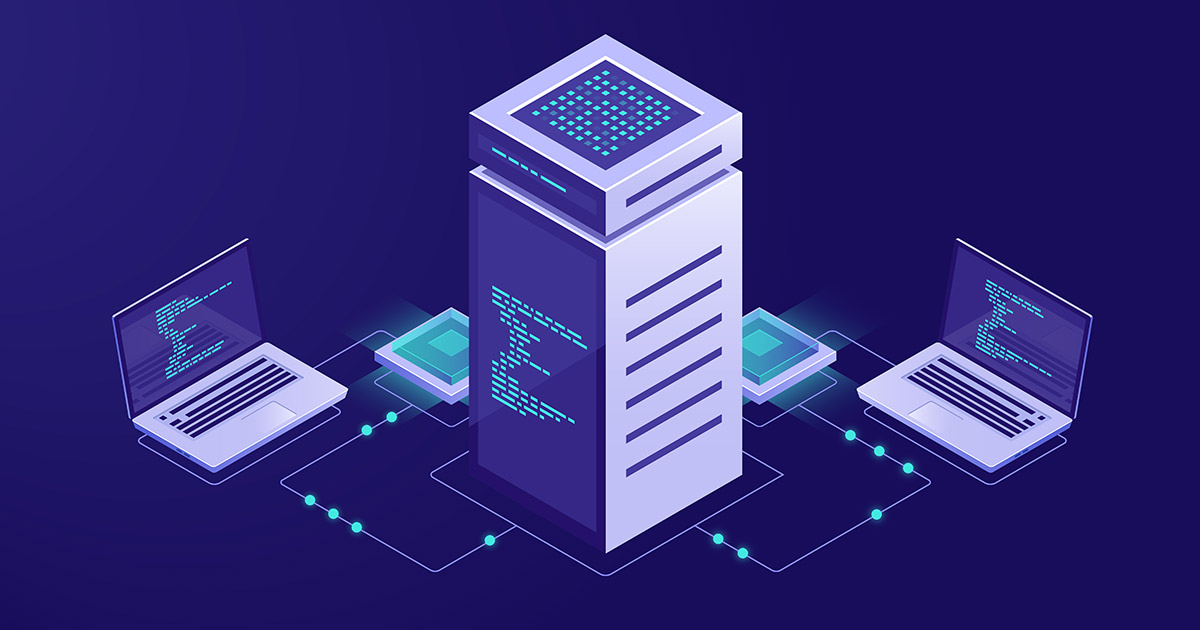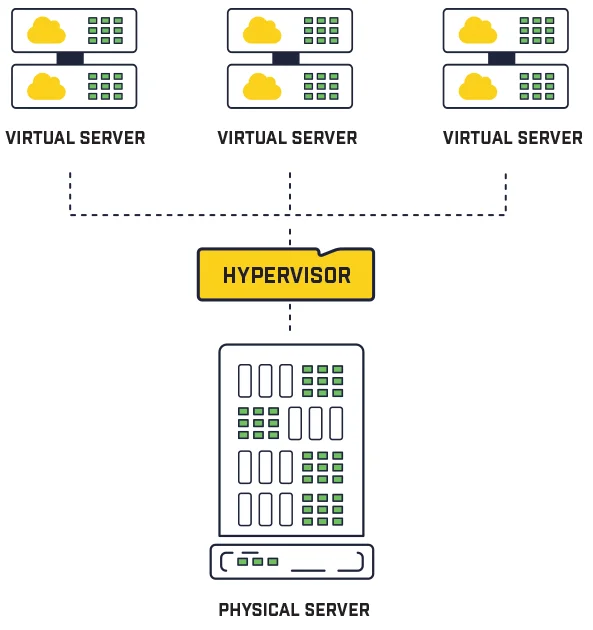Virtual Private Servers - VPS
Last Updated: January 9th, 2024 8 min read Servers Australia

What is a VPS?
A Virtual Private Server - VPS is a virtual machine that acts as a dedicated server within a larger physical server, allowing users to have greater control and customisation over their hosting environment.

How does a VPS work?
Physical Server
Hypervisor
Operating Systems
Isolation
Resource Allocation
Networking
Control and Customisation
Physical Server
A powerful physical server is divided into multiple virtual compartments using virtualisation software. Each compartment acts as an independent server and these are the virtual private servers.
Hypervisor
The virtualisation software, often called a hypervisor, manages and allocates resources (CPU, RAM, storage) among the virtual servers. The hypervisor ensures that each VPS operates in isolation from the others, even though they share the same physical hardware.
Operating Systems
Each VPS runs its own operating system, chosen by the user or administrator. This operating system is separate from the host system and other virtual servers on the same physical machine.
Isolation
Virtualisation provides a high degree of isolation between VPS instances. This means that actions or issues on one VPS do not directly affect others, providing a level of security and stability.
Resource Allocation
The physical server's resources (CPU, RAM, storage) are allocated dynamically based on the needs of each VPS. This allows for efficient resource utilisation, and users can often scale up or down depending on their requirements.
Networking
Each VPS has its own networking configuration, including its own IP address. Networking is typically managed by the hypervisor, ensuring that communication between VPS instances and the outside world is secure and controlled.
Control and Customisation
Users have administrative access to their VPS, allowing them to install and configure software, control security settings, and make customisations to meet their specific requirements.
Why choose VPS Server for your business website?
When you create a website, your business is often brand new, and all you need is a place to host it. This is when most new businesses sign up to a shared hosting plan where a service provider will host your website alongside other business websites and take care of security updates, security, and optimisation of the underlying platform. Shared hosting can be limiting, and as your business grows, there will come a time when you will start to consider upgrading your shared hosting plan. The big question is, when?
We’ve taken the guesswork out of it for you and have created a handy guide to walk you through the signs that it is time to consider a VPS.
When your website slows down
As your business grows, you are going to be adding more content and graphics to your website. The more content you have, the slower your site will start to run. In a shared hosting situation, there is a limit to how much content you can add to your site before it significantly impacts speed and performance. A slow website means one thing; lost business. Tech-savvy consumers hate nothing more than a website that doesn’t run at top speed, especially when you have hundreds of other websites offering the same services and products.
Upgrading to a VPS will significantly increase your website’s loading times and allows you to add as much content as you need. A VPS is dedicated to your business and doesn’t share resources with anyone else, so your website’s speed and performance will not be impacted by the actions of your server neighbours.
When your website traffic increases
As your business becomes more popular, your website will attract more traffic to it. Eventually, your shared hosting plan won’t be able to handle the volume of traffic your business success attracts.
Virtual Private Servers are designed to have enough RAM to handle a lot more traffic than a shared hosting arrangement. So, if you’ve noticed an increase in the amount of web traffic to your site, then it’s time to consider an upgrade.
When you need more security
Whilst shared hosting with a reputable supplier is secure and safe from malicious attacks, a VPS offers more security and flexibility on how much protection you require.
A Virtual Private Server gives you the option to install extra firewalls and configure stricter security rules and restrictions, giving you added protection. This is especially important on E-commerce websites.
When you need more control and scalability
In the case of shared hosting, you usually have very limited administrative access to your hosting environment and very little control over how your environment is customised.
In the case of a VPS, you will have full root and administrative access. You will also be able to fully customise your server in terms of the operating system, control panels, amount of RAM, and hard disk space. So, you’ll be able to increase and decrease the resources you need as your business changes.
When your own IP address is essential
When you are sharing hosting, you will share your IP address with multiple other websites. This means that if one of those sites is not reputable, it will impact your SEO ranking and site reputation.
When you upgrade to a VPS, you will have your own dedicated IP address. This means that your website will be more secure and less susceptible to the actions of those sharing your server.
When your website has sensitive data
It’s not a good idea to host a website that contains sensitive data on a shared hosting plan. This opens you and your website users up to malicious attacks and the misuse of this information.
Sensitive data and payment information are best hosted on a VPS or a Dedicated Server. This is so that information is isolated and safe. Research shows that hackers find it easier to target websites on shared hosting environments that share one IP address.
VPS servers are great for an E-Commerce store
A website that stores or processes payment information needs to be PCI (Payment Card Industry) compliant. Statistics show that many websites on a shared hosting plan fail PCI certification.
A VPS has a dedicated Operating System which gives it a far better chance of passing PCI certification. So, if you want to start selling goods or services on your website, it would be a good idea to upgrade to a VPS.
Most people have heard of dedicated hosting and shared hosting. VPS or Virtual Private Servers combine the best of shared and dedicated hosting to create a web hosting solution that can suit a variety of business needs. In the VPS model, multiple virtual partitions are created on a single physical server and each user is allocated their own space, independent from other users on that particular server. Furthermore, advancements in virtualisation technologies have made using VPS solutions much more reliable than they previously were.
4 reasons to choose VPS over shared hosting
1. Improved reliability
To cut to the chase, VPS hosting is a huge upgrade over shared hosting—think shared hosting but with a lot of improvements. One of these is improved reliability and stability. This is because in a VPS model, each user’s resources are isolated from that of others. This means any demanding tasks being run on another user’s server partition will not affect your website or application’s performance. In a shared hosting solution, if a certain user stresses a server’s resources, there is a good chance that the whole server would fail, causing issues for other users. However, in a hybrid model each user has their set of dedicated resources which ensure your site remains online even if another user’s server fails.
2. VPS hosting gives you control and security
Through virtualisation, VPS hosting ensures that even if you are sharing the physical server with other users, your operating system and applications are restricted to a private server environment. This way, other users sharing the system cannot access the resources dedicated to you. Also, unlike in shared hosting, VPS hosting gives you complete root access, letting you tweak the server settings as per your website’s needs. This means no more having to wait for an administrator to approve software updates or installing third-party applications. It’s almost like having your own Dedicated Server.
3. VPS hosting is flexible and scalable
As mentioned in the previous point, VPS hosting gives you granular control over the configuration of your server. You can decide which operating system and apps to run without worrying about what other users are installing on their partition. And if you do decide to change or upgrade your operating system and apps, you don’t have to worry about switching to a server with better resources. VPS solutions have flexible resources that scale according to the user’s requirements. So, if an application requires extra memory and storage space, you can just upgrade your plan and your new server is ready to go.
4. Affordable VPS hosting
If reliability and scalability haven’t sold you on the advantages of VPS hosting, then the costs surely will. Opting for a VPS solution is the best way to get better control and security for your website without burning a hole in your pocket. While it is more expensive than traditional shared hosting, VPS hosting is much more affordable than dedicated hosting as it uses the same principle of resource sharing.

